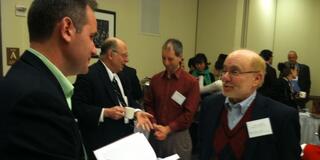Alumni Day 2013

A beautiful spring morning kicked off SIPA's fifth annual Alumni Day on April 27, attracting 120 alumni and friends to Faculty House on the Morningside Heights campus. The program featured an address by Judy Cheng-Hopkins MIA ’78 bracketed by faculty- and alumni-led discussions and the first-ever alumni/faculty book fair and concluded with reunion cocktails and dinner for more than 100.
Cheng-Hopkins, who received a Global Leadership Award from the School earlier in April, is the UN deputy secretary-general for peacebuilding support. Her remarks addressed what she called "the changing nature of conflict and what it means to build peace today."
While democracy continues to grow worldwide, Cheng-Hopkins said, a few dozen states that have seen conflict in recent decades remain fragile and more likely to face a relapse into a conflict. Such nations are problematic for many reasons: because conflict and fragility breed poverty in a vicious cycle, they continue to rely on humanitarian aid, compromising their movement toward self-reliance. Another concern, she said, is that fragile states can provide refuge for terrorists.
"It takes a generation to take a vicious cycle and turn it into something virtuous," she said. "And peace will only come when [actors in an affected nation] want it — we on the outside can only support it."
Cheng-Hopkins concluded by sharing a mnemonic based on prerequisites for peace — security, healing, livelihoods, economy, and public administration — and inspired by a Yiddish word familiar to most New Yorkers: In short, she said, "Peacebuilding is a shlep."
The program began with a greeting from Alumni Council chair Roger Baumann IF ’84, MIA ’85, who ticked off a number of successful alumni initiatives at SIPA, including admissions ambassadors in nations around the world and an expanded mentoring program that matched 250 alumni with fellow alumni and current students.
Baumann noted the difficulties inherent in keeping tabs on SIPA's globetrotting population of graduates. "Our alumni are a particularly challenging lot," he said.
Interim Dean Robert Lieberman said SIPA continues to send its graduates around the world to exciting careers and saluted the Alumni Council for building the School's network in multiple sectors. "Your work is paying off," he said.
"We are building an extraordinary school," Lieberman said, adding that SIPA is on the verge of a great leap forward. "We continue to reimagine public-policy education, knitting depth and rigor of policy analysis with a global outlook that has been the School's hallmark."
In short, he said, "SIPA is a leader of the globalization trend... [it] is really on the rise thanks to a lot of people, but especially thanks to you, our alumni."
SIPA and Columbia faculty and SIPA alumni appeared in a series of morning and afternoon presentations. In one popular panel, several students joined Professor Elisabeth Lindenmayer to discuss their trip to North Korea in May 2012. At another, Professor Arvind Panagariya discussed issues treated by his new book on economic growth in India. Other panels focused on cybersecurity, disaster preparedness, European finance, and an overview of world hot spots.
In the last event at Faculty House, a dozen alumni and faculty members manned tables to promote books they had authored on a variety of subjects.
Scott Pesner, director of alumni affairs, said he received positive feedback from participating alumni: “They enjoyed hearing about and discussing some interesting topics in global public policy and appreciated that there were plenty of opportunities for networking.”
After the book fair, the day shifted to the Kellogg Center in the International Affairs Building for a reunion dinner attended by more than 100 guests from classes ending in 3 or 8.
Capping the day with a reunion event engaged a number of alumni who hadn’t been back to campus in a long time, Pesner said. “We continue to engage alumni in new ways,” he said, “We’re not just bringing them back to campus but helping them connect to SIPA overall.”